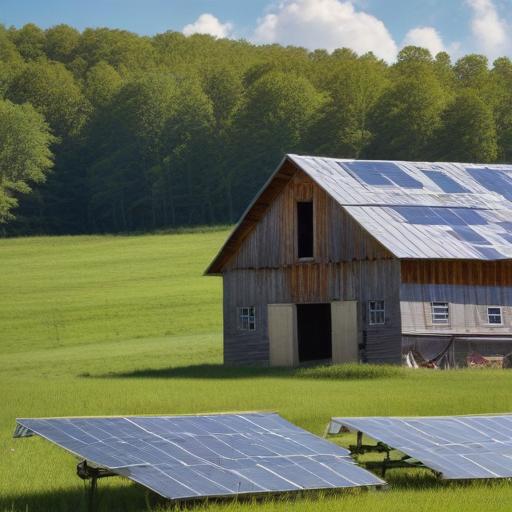Washington, D.C. — The U.S. Department of Agriculture announced policies this week to halt funding for solar panel projects on productive farmland and to prohibit the use of solar panels manufactured by foreign adversaries in USDA projects. Officials said the measures are aimed at protecting both the nation’s food production and its national security interests.
Supporters of the move argue that Tennessee’s farmland should be devoted to growing crops that feed the state and the country, not to housing solar infrastructure funded by foreign manufacturers. They view the policy as a safeguard against subsidies associated with the Green New Deal and a step toward ensuring food security. In a related development, the USDA also announced an $89 million investment in 13 rural development projects across Tennessee. The announcement came during a visit by a national official to Lebanon, Tennessee, for the Future Farmers of America Ham Breakfast, where attendees celebrated what supporters call efforts to Make Agriculture Great Again and bolster rural communities.
The administration’s backers say the rural investments will empower Tennessee’s agricultural sector to prosper for years to come, strengthening local economies and farm resilience. Critics, meanwhile, will watch how these policies affect ongoing solar energy efforts on farmland and the broader push toward renewable energy in rural areas.
Weekly Rundown
In a broader political frame, the article’s author contends that crime rose under the Biden administration and argues that the November elections gave Republicans a mandate to strengthen public safety. The author highlights several proposed bills intended to empower law enforcement and curb crime, including the AFTER SCHOOL Act, the Federal Carjacking Enforcement Act, the Restoring the Armed Career Criminal Act, and the Restoring Law and Order Act.
Technology and safety
The piece also addresses online safety, arguing that major platforms have fallen short in protecting children. It calls for a renewed push to pass a Kids Online Safety Act to curb what it describes as harmful design choices by large tech companies and to prevent the exploitation of minors online. The author frames this as part of a broader effort to protect families in the digital age.
Creative works and foreign actors
Tennessee’s creative community is cited as a target of foreign piracy and related financial fraud. To counter this, a discussion draft of the Block Bad Electronic Art and Recording Distributors (Block BEARD) Act was introduced, with the aim of giving creators a more straightforward path to legal action in U.S. federal courts against those who pirate or misappropriate creative works.
Indo-Pacific security concerns
The piece notes China’s unilateral decision to alter international flight routes, arguing that such moves threaten regional safety and stability. It describes these actions as undermining international order and potentially creating conflict around routes managed in the Taipei Flight Information Region. The author says colleagues were urged to engage with the International Civil Aviation Organization to mitigate adverse consequences and resist political pressure from the Chinese Communist Party.
Marsha’s Roundup
ICYMI coverage highlights concerns about Meta’s new “map” feature, which is described as risky because it may expose children’s locations to dangerous individuals. The author and colleagues demand that Meta shut down the feature and continue to press for stronger protections for young users.
Optional add-ons for value and context
– What this means for farmers and rural Tennessee: The USDA policy change could shift land use priorities and influence investment decisions for farmers who balance crop production with any potential solar projects. Stakeholders may look for clear timelines and guidance on exemptions or reallocations to ensure ongoing agricultural productivity.
– Economic outlook: The $89 million rural development program is positioned to support infrastructure, workforce training, and community facilities in rural areas, potentially creating jobs and improving access to markets and services.
– Positive angle: The policy mix signals an emphasis on food security and rural self-reliance, alongside a push to strengthen online safety and protect creative industries, which could resonate with communities prioritizing safety, security, and economic stability.
If you’re preparing a longer piece, you might add quotes from local farmers and rural developers on how USDA decisions impact day-to-day operations, plus reaction from regional lawmakers to provide a fuller picture of the policy landscape shaping Tennessee’s agricultural and rural communities.
Summary note
The article covers a federal policy shift affecting solar energy on farmland, a substantial rural development investment in Tennessee, and a suite of associated political and safety measures tied to agriculture, online safety, creative rights, and regional security. It blends official policy announcements with supportive political commentary and advocacy on several fronts, casting the developments in a pro-rural, pro-national-security light while addressing ongoing debates about technology, safety, and foreign involvement.
Overall tone and outlook
The piece maintains a generally pro-policy stance toward the administration’s decisions and related legislative efforts, with emphasis on protecting food security, rural development, and child safety. It offers a hopeful angle by highlighting investments in rural Tennessee and a focus on safeguarding communities, while acknowledging ongoing debates on energy, safety, and online platforms.
